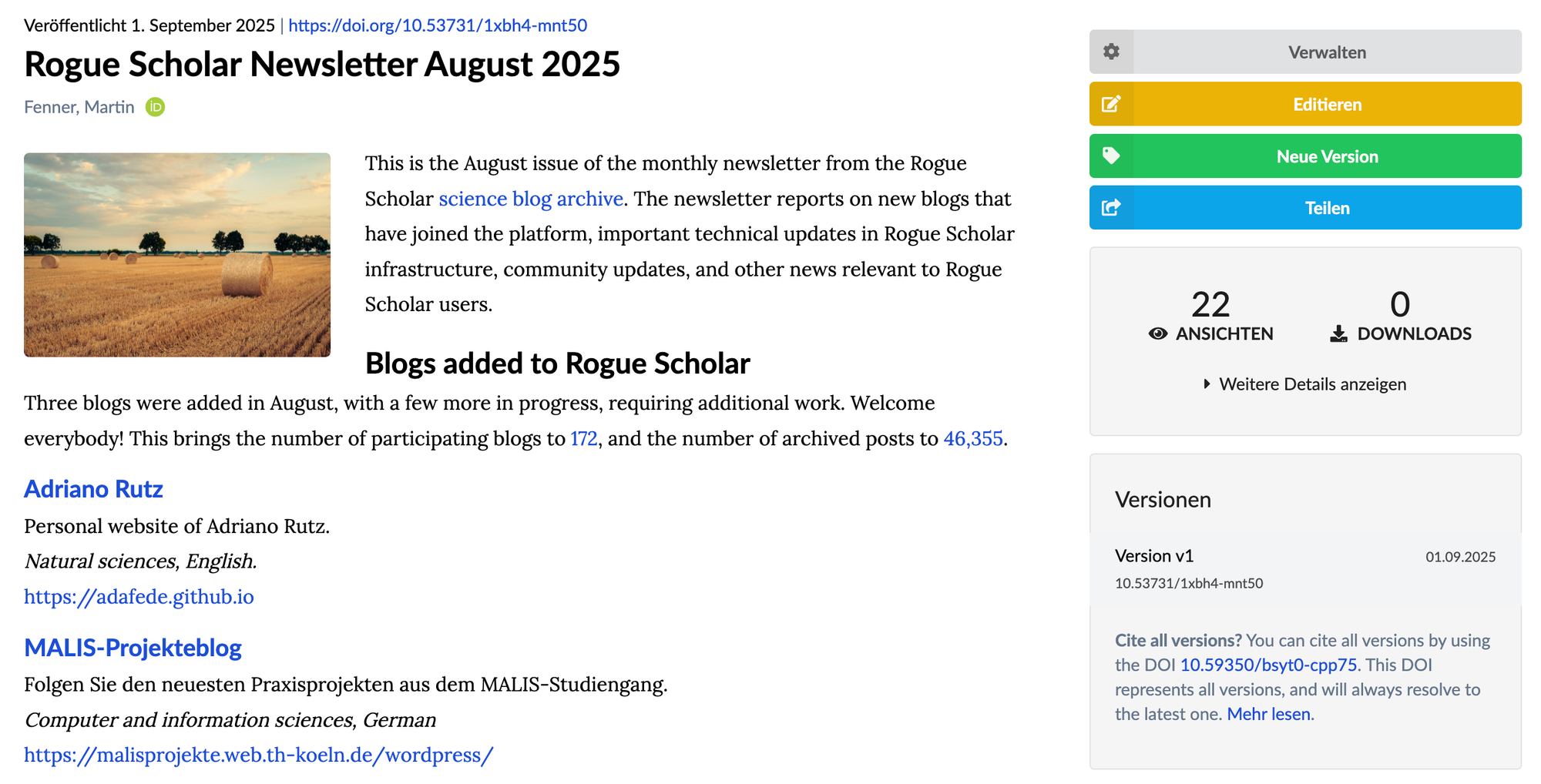This week, the Rogue Scholar science blog archive started registering DOIs and metadata with Crossref using the InvenioRDM repository platform rather than relying on external tooling. InvenioRDM has of course supported DOI registration with DataCite for a long time, so this adds another option for repositories hosting reports, preprints, dissertations, or other textual documents.
Rogue Scholar has registered content with Crossref since its launch two years ago (more than 45,000 blog posts to date), and migrated to the InvenioRDM repository platform 12 months ago, but it always relied on external tooling for Crossref integration. This new Crossref integration into InvenioRDM simplifies the DOI registration workflow. The main difference for Rogue Scholar blog authors and readers is that automatic DOI registration has become faster, happening within a few minutes after a blog post on a participating blog is published or updated.
Rogue Scholar checks the RSS feeds of participating blogs for new or updated content every 10 minutes. When new or updated content is found, uploading the post to InvenioRDM and registering/updating a DOI and metadata with Crossref now happens in 1-2 minutes (depending on how many posts have to be updated at the same time). Further improvements in the time it takes to register blog posts with InvenioRDM and Crossref will depend on improving the monitoring of RSS feeds, e.g. by adding a push mechanism (triggered by the blog when content is updated) instead of the current pull mechanism.
Versioning
The InvenioRDM platform supports versioning of content, which is particularly important for datasets and software, but also relevant for text documents such as blog posts. Examples include major new versions of content, possibly after having received feedback via peer review using the Publish, Review, Curate workflow. Other use cases are corrections and retractions. Crossref added version information to its metadata schema with the 5.4.0 release in March, and I am currently testing this functionality in the Rogue Scholar Staging server:

One challenge is that the InvenioRDM Crossref integration supports multiple DOI prefixes, so this is a bit more work compared to the DataCite integration only supporting one DOI prefix. In addition, versioning adds complexity to DOI suffix generation. Luckily, the built-in InvenioRDM tooling uses the same DOI naming scheme that Rogue Scholar has used since its launch, but going forward, Rogue Scholar will no longer support custom DOI suffixes that I introduced for WordPress and Substack blogs. Several blogs participating in Rogue Scholar do their own DOI registrations, and those DOIs (what InvenioRDM calls externally managed DOIs) will not be versioned.
InvenioRDM
Crossref DOI registration uses the commonmeta-py Python package to generate Crossref XML metadata and a fork of the invenio-rdm-records package to integrate with InvenioRDM. After completing versioning support and more testing, the functionality will be merged into the InvenioRDM core functionality, and the discussion with the other InvenioRDM maintainers has started. Soon, every InvenioRDM instance will be able to use Crossref DOI registration with a simple configuration setting (and Crossref member credentials), very similar to how DataCite DOI registration works.
References
- Fenner, M. (2024, September 2). Rogue Scholar migrates to InvenioRDM. Front Matter. https://doi.org/10.53731/sdazp-kzn55
- Feeney, P. (2025, March 19). Version 5.4.0 metadata schema update now available. Crossref Blog. https://doi.org/10.13003/325070
- Fenner, M. (2025, January 16). Persistent identifiers, random strings, and checksums. Front Matter. https://doi.org/10.53731/6kfyy-nq280
- Marcum, C. S. (2025, April 8). Drinking from the firehose? Write more and Publish Less (Version 2). Upstream. https://doi.org/10.54900/vr8ax-nz653
- Marcum, C. S. (2025, April 8). Peer-Review for a Blog Post? My Experience with MetaROR. Upstream. https://doi.org/10.54900/bymaz-4fw37
- Hendricks, G., Lammey, R., & Rittman, M. (2022). Towards a connected and dynamic scholarly record of updates, corrections, and retractions. MetaArXiv. https://doi.org/10.31222/osf.io/6z7s3


